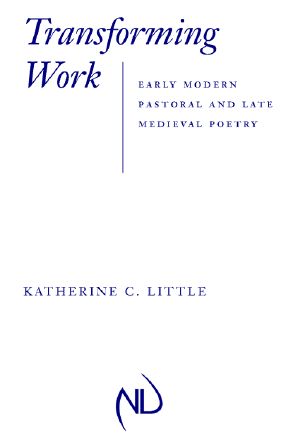Transforming Work

- Authors
- Little, Katherine C.
- Publisher
- University of Notre Dame Press
- Tags
- lit014000 literary criticism , poetry , poe022000 poetry , medieval
- ISBN
- 9780268033873
- Date
- 2013-08-28T00:00:00+00:00
- Size
- 2.99 MB
- Lang
- en
Pastoral poetry has long been considered a signature Renaissance mode: originating in late sixteenth-century England via a rediscovery of classical texts, it is concerned with self-fashioning and celebrating the court. But, as Katherine C. Little demonstrates in Transforming Work: Early Modern Pastoral and Medieval Poetry , the pastoral mode is in fact indebted to medieval representations of rural labor. Little offers a new literary history for the pastoral, arguing that the authors of the first English pastorals used rural laborers familiar from medieval texts—plowmen and shepherds—to reflect on the social, economic, and religious disruptions of the sixteenth century. In medieval writing, these figures were particularly associated with the reform of the individual and the social world: their work also stood for the penance and good works required of Christians, the care of the flock required of priests, and the obligations of all people to work within their social class. By the sixteenth century, this reformism had taken on a dangerous set of associations—with radical Protestantism, peasants' revolts, and complaints about agrarian capitalism. Pastoral poetry rewrites and empties out this radical potential, making the countryside safe to write about again. Moving from William Langland’s Piers Plowman and the medieval shepherd plays, through the Piers Plowman –tradition, to Edmund Spenser’s pastorals, Little’s reconstructed literary genealogy discovers the “other” past of pastoral in the medieval and Reformation traditions of “writing rural labor.”
" Transforming Work is an exciting, perceptive, and innovative monograph which shows how poetry from the fourteenth to the sixteenth centuries represented work and labour. In doing so the book poses a serious challenge to prevailing orthodoxies, establishing a courteous dialogue with literary texts and literary critics. Katherine Little shows herself throughout to be an adept and alert reader, committed to revealing what has remained hidden for far too long, our understanding of the relationship between the major literary works of Langland, Googe, Barclay, and Spenser, the literary traditions to which their work belonged, and the reality of work in medieval and early modern England." — Andrew Hadfield, University of Sussex
"This book comes after many other studies of the continuity of the classical pastoral tradition in England, and corrects a general tendency to neglect the medieval influences on the development of the tradition. I found the study as a whole immensely stimulating." — Derek Pearsall, University of York
"Katherine C. Little's elegant and fluidly written book offers a necessary corrective to a generic narrative that usually occludes the medieval period's contributions to pastoral. As such, her work is a welcome addition, since it both revises the Renaissance literary map and offers new contexts for reading familiar late medieval texts as part of this larger tradition." — Kellie Robertson, University of Maryland